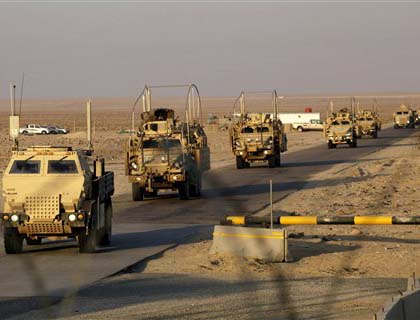Though the American military withdrawal started according to fixed schedule, many maintain about the essentiality of American presence for a longer period. Why US combatant troops left when there is no guarantee for stable and democratic Iraq?
Washington has already paid a lot. The war has cost it too much. So, why it is going to put in danger the achievements for which 2 million American troops fought during past nine years; four thousand lost lives; thirty thousand injured and around a trillion was imposed on the federal treasury department? The above cost only concerns to calculable data, and has nothing to do with the political disgrace and diplomatic damages dealt by it.
Let's put it this way; the 9/11 incidents highlighted the new growing global threat that came through terror groups like that of al-Qaeda. Indeed, the incident shocked all American security establishments which were viewed since the end of cold war impassable.
The organization and execution in such a giant attack on New York's twin towers dealt a threatening blow to security prestige of the country. The shock was not limited to US, but countries across the globe were alarmed by the incidents. Thus, the 9/11 attacks were not only followed by worldwide condemnation but led into establishment of strong global anti-terrorism front under the US leadership.
Former US president well-known for his aggressive policies initiated the war against terrorism and intervened in Afghanistan with the support of Northern Alliance and terminated the six-year long administration of Taliban regime. The opposition sounds amidst storming hatred against Taliban and al-Qaeda were not heard. Even the close ally of Islamic Emirate under mounting pressure from global mentality soon forced them to turn back and join anti-al-Qaeda alliance.
After the outstation of Taliban regime, it was the turn of Saddam regime to encounter destiny. The Iraq war was not that easy for US because the anti-insurgency struggle in Afghanistan had not come to an end. But Mr. Bush did not care much. Without the United Nations' mandate it attacked the Iraq and justified the action on the basis of two factors——existence of mass destruction weapons and linkage with al-Qaeda and other terror network, which were both proved false and unauthentic.
To justify military engagement, a new idea was put ahead: the world without Saddam Hussein is much better than it was with him.
So, anyhow, the illegality of war and increasing criticism within the country supported Mr. Obama who promised to bring back US combatant force from the country. But obviously and wisely he did not act quickly because any hurried action could prove consequential.
He supported the military surge in Iraq when around 100 troops were regularly losing lives per month. The military surge which started during President Bush and continued during his incumbency restored peace and stability and ended sectarian violence.
The restoration of violence provided the situation for President Obama to do what he promised during his presidential election: calling the US troops back to home. During recent months, the American troops were not engaged in operations and all security responsibilities were handed over to Iraqi security forces. But they were like a shield against any existential threat though they were not engaged in operations. Their mere presence could help nation-building process and forced belligerent forces to remain silent and passive.
Moreover, there are regional forces like Iran which tries its most to influence political process and direct the country towards a Shiite religious government which perhaps necessarily would build a very friendly relation with Tehran.
In addition, the withdrawal would fuel destructive competition on the sectarian line, which would further destabilize the country and pave the way for undemocratic regional countries to use Iraq for fulfilling their own political ambitions.
The above issues were working against the inner will of Washington to call troops back. There were reports about secret negotiation on extension of US military presence to train Iraqi forces, but the withdrawal clearly portrayed that those negotiations had failed and officials could not agree on shared framework.
While withdrawing, American top officials clearly warned regional countries and pinpointed Iran to avoid interfering in Iraq's domestic affairs. Even now, only days after the completion of military withdrawal, Baghdad officials are talking about looming dangerous sectarian violence. The Sunni vice president Noori al-Maliki is blamed for a terror linked activities. And reportedly, he is barred from overseas travel by judge but Mr. Tareq Hashemi has rejected the accusations.
Some other Sunni leaders are also alarmed about the possible reemergence of sectarian violence and they generally blame Prime Minister Noori al Maliki for it. If the country moves towards such an evil prospective, Iraqi security forces would not be able to control the situation. It is still not clear that the security establishment deal indiscriminately once the sectarian violence starts. And it is also not guaranteed that sectarianism would creep within the security establishments.
There is the possibility of collapse of the ruling coalition. If the Sunni political parties leave the coalition, the government of Noori- al-Maliki would collapse. And his party and remaining coalition would not complete the quorum for establishment of a new government.
But some analysts are worried about that scenario too, saying it would further lead the country towards dictatorship. If the government collapses, there would be parliament but Mr. Prime Minister has the right to stay in power till the formation of a new government. Anyhow, it is too early to talk about the future, but the blow of withdrawal would shack the tree of democracy in Iraq.
But regarding the question why US decided to pull out, there are a lot of assumptions like the secret promise of Noori-al Maliki to Iran or the economic challenges within the country, increasing civil opposition to war and etc., about which I will talk in some other articles.

